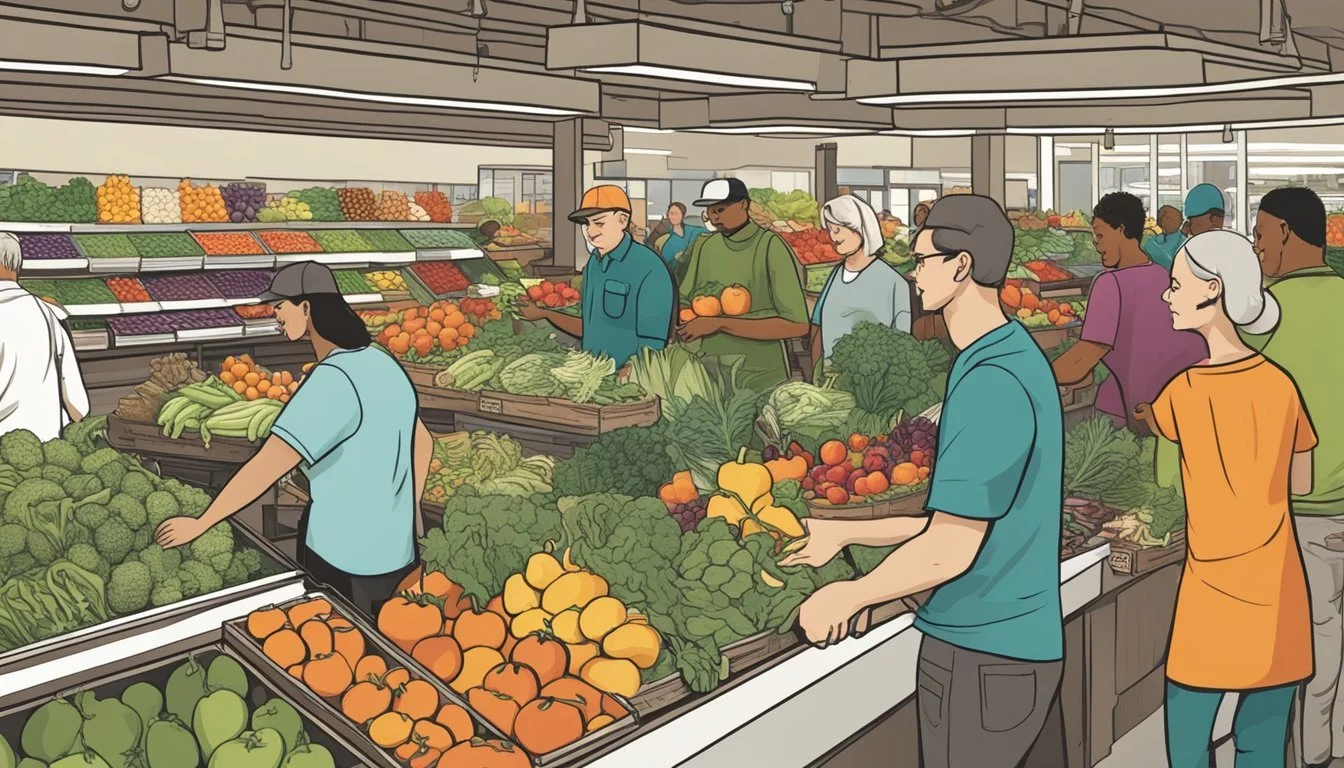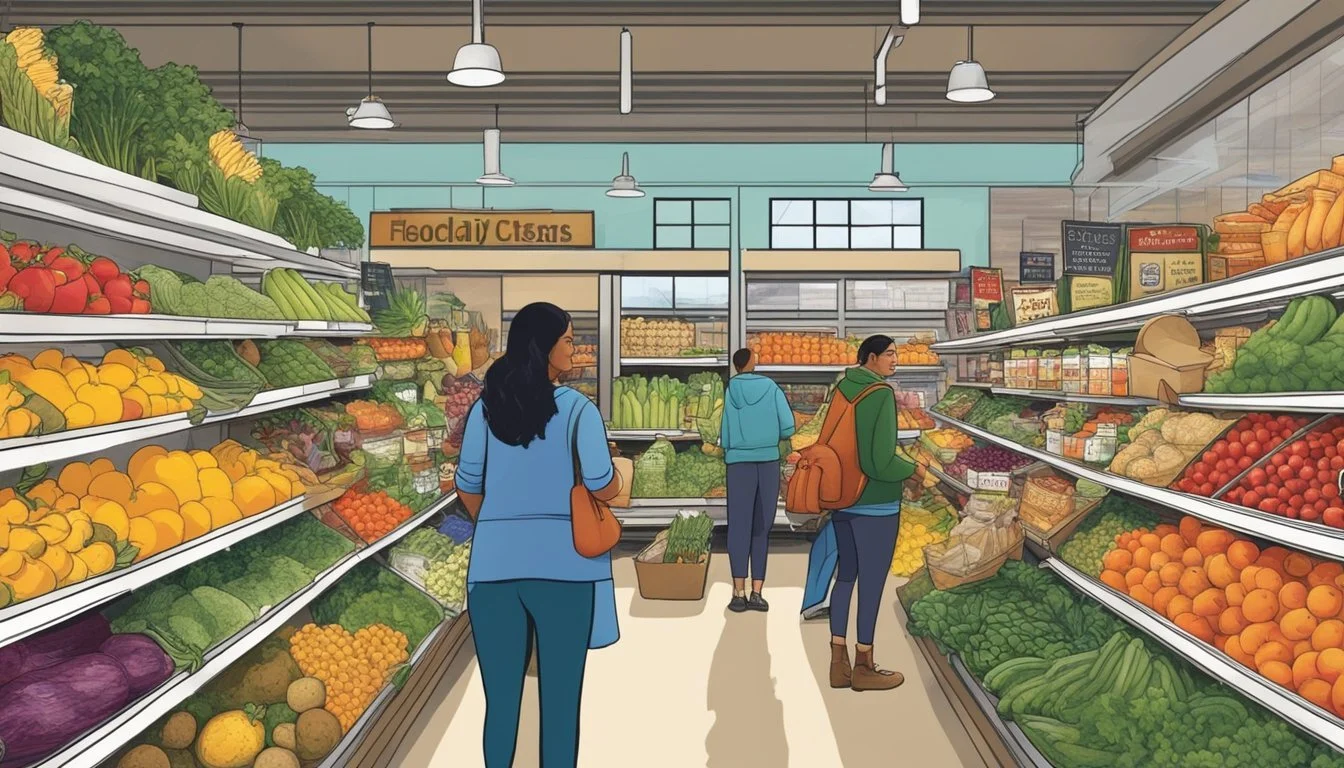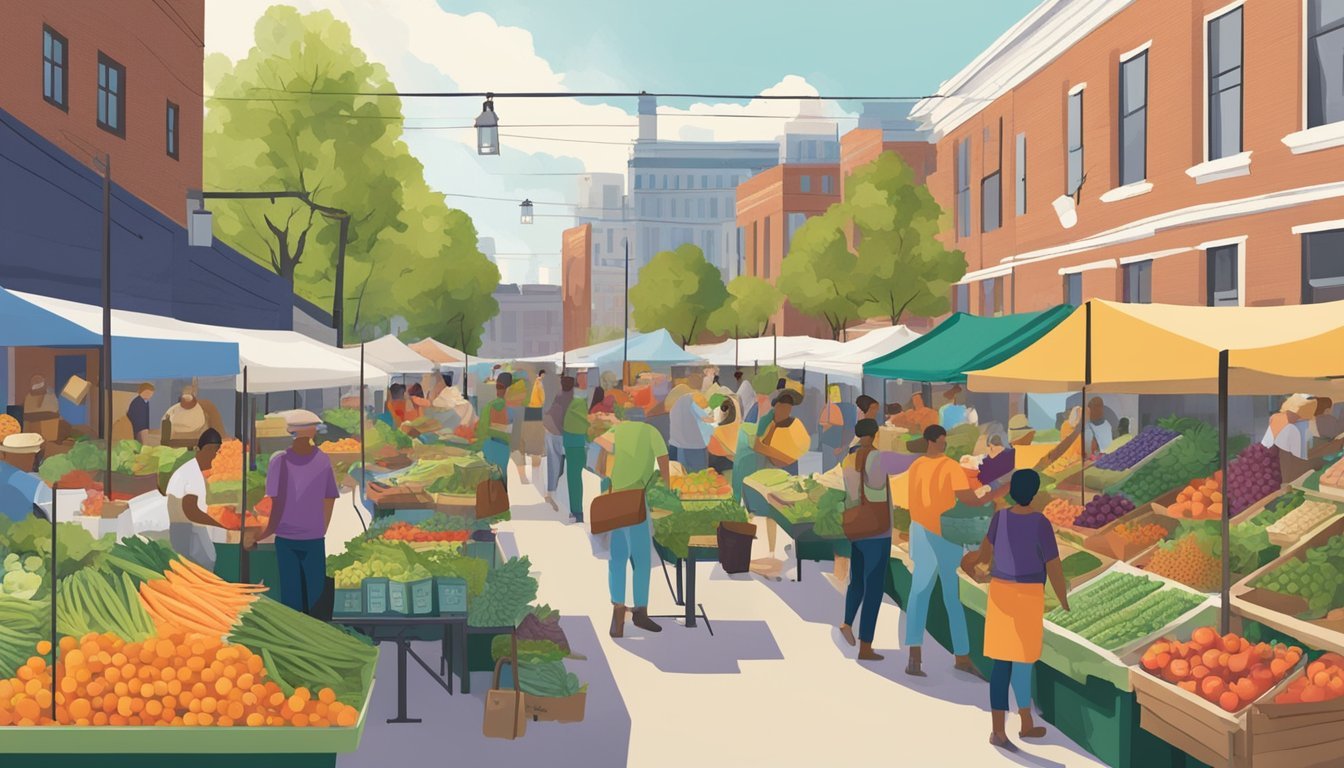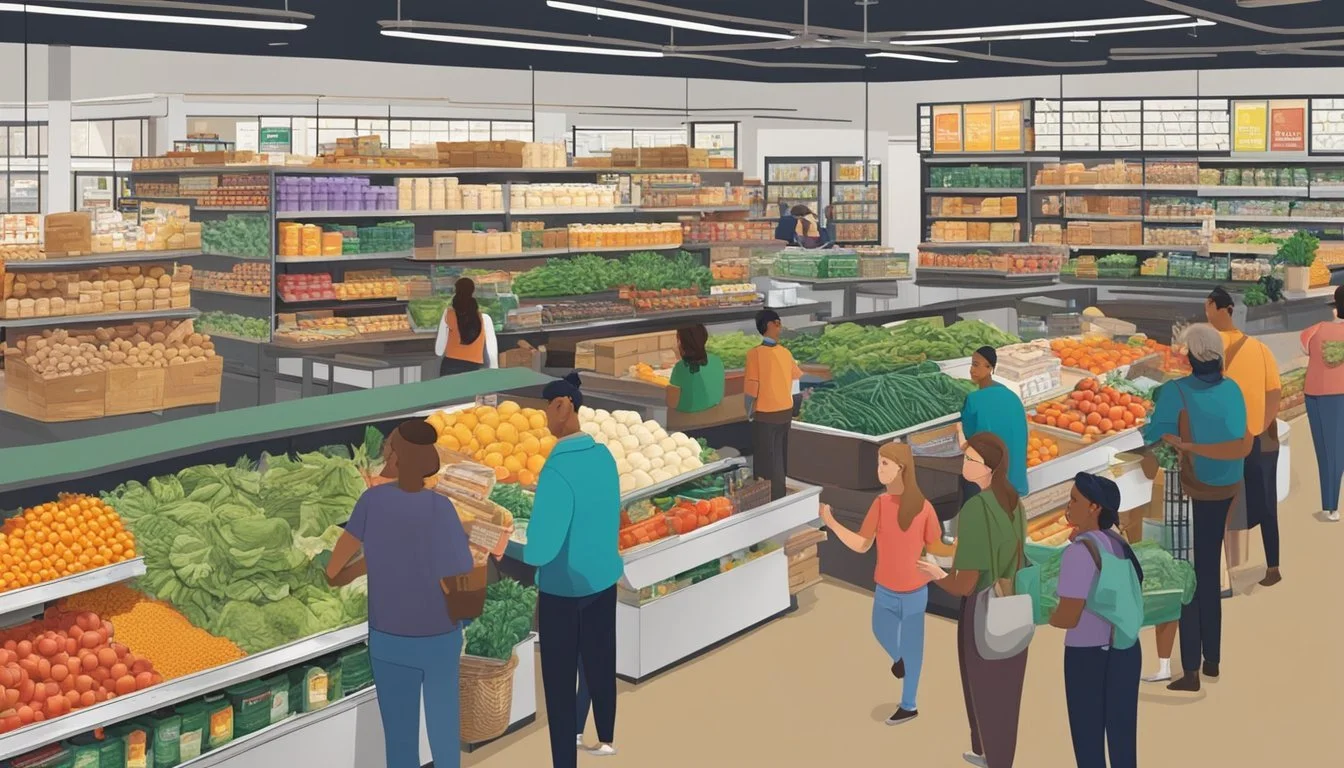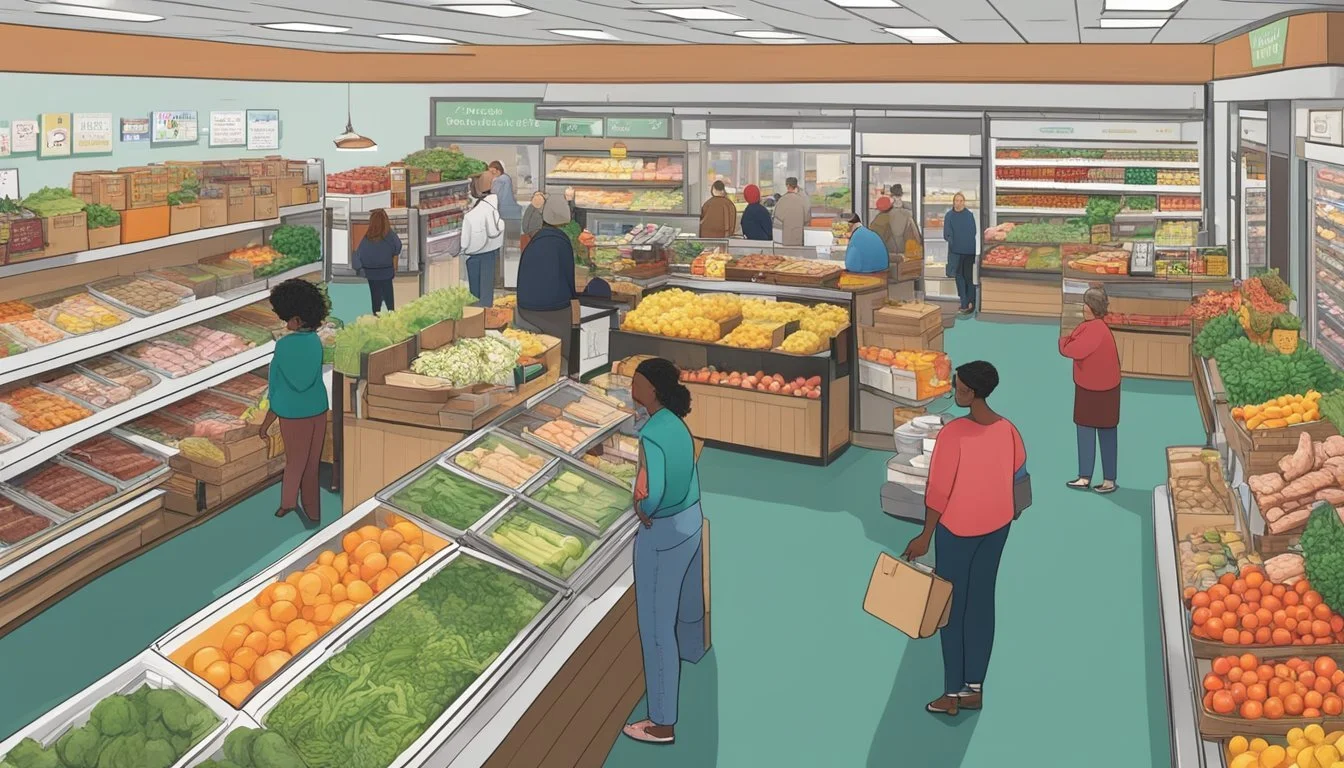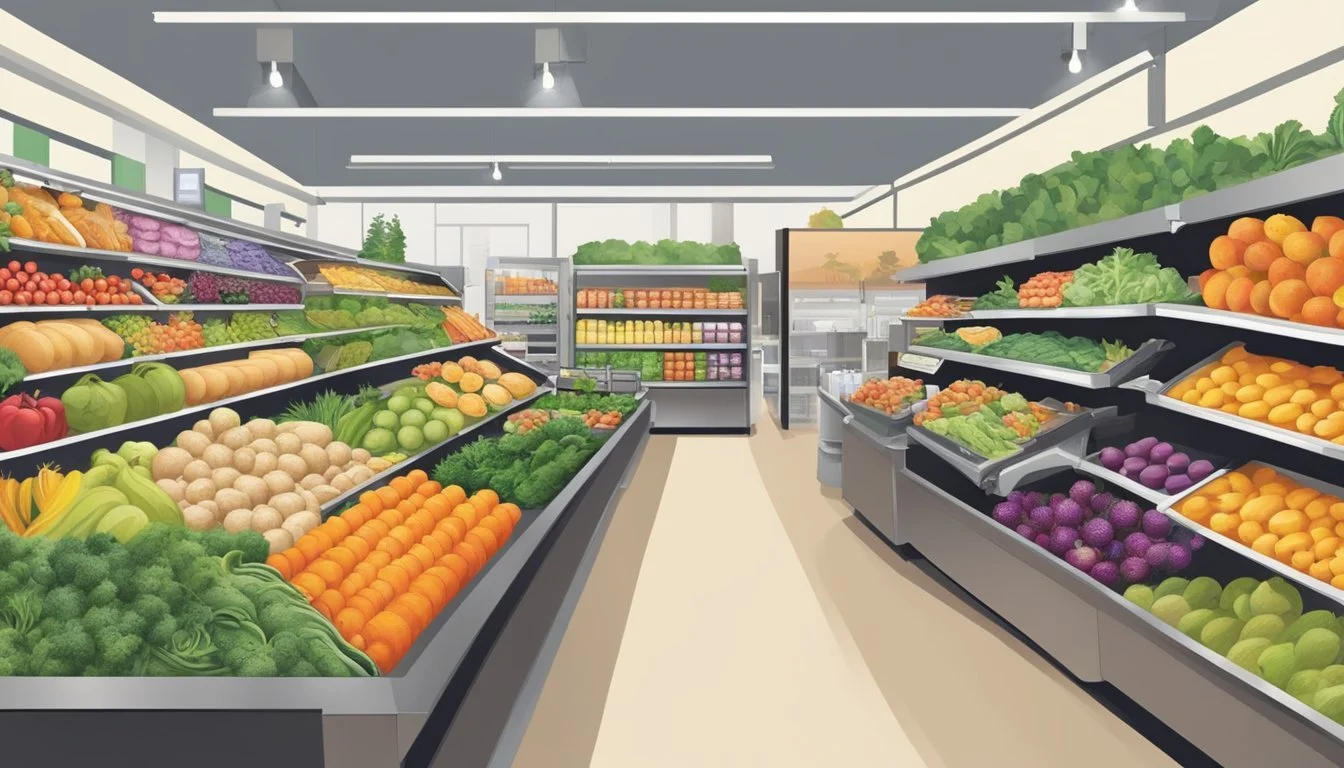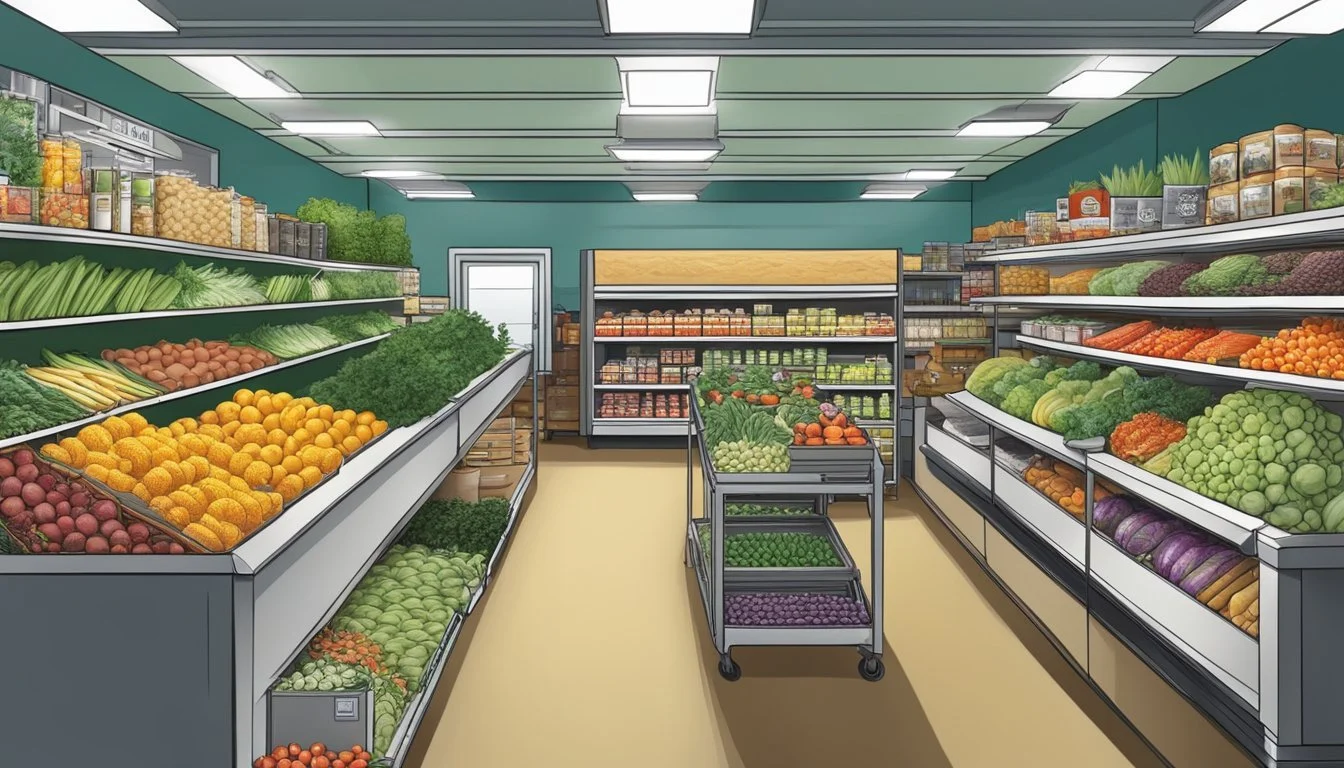Guide to Food Co-Ops in Omaha, NE
Your Essential Resource
In Omaha, NE, the community has access to a variety of food cooperatives that champion the concept of directly connecting consumers with locally sourced, often organic, produce, and goods. A food co-op operates on a membership basis but is open to all shoppers, representing a collectively-owned entity that prioritizes sustainable agriculture and fair trade practices. By fostering a close relationship with local farmers and artisans, these co-ops not only contribute to the local economy but also ensure that residents have access to fresh and nutritious food.
Food cooperatives differ from standard grocery stores by allowing members to have a say in business decisions, reflecting the preferences and values of the community they serve. In Omaha, co-ops like the Nebraska Food Cooperative provide a year-round online farmers’ market where individuals can purchase goods directly from producers across the state, ensuring freshness and supporting Nebraska’s agricultural community. With technology-driven platforms, these cooperatives have simplified the process of buying local, enabling members and non-members alike to benefit from the offerings of nearby farms and businesses.
The cooperative model has found fertile ground in Omaha's vibrant food scene, encouraging sustainable consumption and more profound community engagement. Offering a variety of products, from heritage-breed poultry eggs to an array of handcrafted goods, Omaha’s food co-ops stand as testament to the city's dedication to community-supported agriculture and mutual support within the food ecosystem. Through their operations, these co-ops deliver not just food, but also an investment into the local community's health, economy, and future.
What Is a Food Co-Op?
A food cooperative, or food co-op, is a democratic entity where members make the strategic decisions. It operates with a mission that emphasizes community benefit over profit.
History and Philosophy of Food Co-Ops
Food co-ops emerged from a desire to create businesses that align closely with the needs and values of their communities. These cooperatives operate on principles of collective ownership and decision-making. Members, who are often local residents and shoppers, have a say in the governance of the store, influencing the type and source of products. Each member holds an equal share and possesses an equal voice, fostering a business model that prioritizes shared benefit and ethical operation over individual gain.
Different Types of Co-Ops
Food co-ops can vary in structure and focus:
Consumer Co-ops: These are owned by the customers who shop there, allowing them to influence the stocked products, pricing, and sourcing.
Worker Co-ops: Here, the employees own the business, contributing to managerial decisions, and sharing in the profits.
Hybrid Co-ops: A combination of consumer and worker ownership offers a unique dynamic between shoppers and staff.
The different types cater to community needs, from overstocked and bulk discount products to organic and special dietary options.
Benefits of Joining a Co-Op
Food cooperatives in Omaha offer myriad advantages to their members and the local community, from supporting the local economy to promoting healthier living and environmental sustainably.
Economic Benefits
When someone joins a food co-op, they contribute to keeping more money within the local economy. These co-ops typically source products, such as produce and meat, from local producers, which can support and even boost the market for locally produced food. By choosing a co-op, members can also take part in democratic decision-making relating to the financial and operational aspects of the business.
Local Producers Support: Members help small-scale local producers thrive.
Financial Control: As part-owners, members guide the economic direction of the co-op.
Social and Community Benefits
Co-ops are deeply integrated into their communities, serving as more than just grocery stores. They often operate under principles that prioritize the community's welfare, which means members have a say in the values and practices of the co-op. Moreover, the very model of a co-op fosters a sense of collaboration and shared purpose among its members.
Member Involvement: Members are involved in business decisions.
Community Focus: The co-op’s goals align with community interests.
Health and Environmental Benefits
Healthier food options and environmental stewardship are key benefits of joining a co-op. Members can access organic produce, grass-fed meats, and cage-free eggs, which are generally held to higher quality standards than those found in traditional grocery stores. Additionally, by selling local produce and advocating for zero-waste practices, co-ops help in reducing carbon footprints and promoting sustainable living.
Quality Food Selection: Access to a variety of high-quality, healthy foods.
Sustainability Commitment: Practices that contribute to ecological health.
Co-Op Membership Explained
Food cooperatives in Omaha offer local residents a unique way to access fresh, local produce and products. Membership in a cooperative, commonly known as a co-op, opens the door to decision-making roles and various benefits.
How to Become a Member
To join a food cooperative, an individual typically needs to pay a membership fee, which may be a one-time payment or an annual contribution. The cooperative's structure is designed to be inclusive, allowing members to have a say in the business operations. Specifics of joining can vary; hence, it is recommended to check with the local Omaha cooperative for precise details.
Requirements for Membership
Completion of an application form
Payment of membership fee (one-time or annual)
Residence within the cooperative's service area for delivery purposes, if applicable
It should be noted that some co-ops might offer subsidized memberships or payment plans for those eligible for SNAP benefits, promoting broader access to quality food options.
Member Responsibilities and Rewards
Within a food co-op, members have certain obligations as well as entitlements. Members might be asked to volunteer, although it's not mandatory for all co-ops. They are also expected to participate in key decisions that guide the cooperative's product selection, quality standards, and pricing.
Responsibilities
Participating in votes and meetings
Volunteering time, if required by the co-op's rules
Staying informed about co-op affairs
Rewards
Access to fresh, often organic and local, produce and products
Dividends or profit-sharing based on the co-op's financial performance
CSA (Community Supported Agriculture) options for direct support of local farmers
In conclusion, being a member of a food cooperative in Omaha means becoming part of a community that values local, healthful food systems and democratic business ownership.
Guide to Omaha's Food Co-Ops
Omaha's food co-operative scene is a thriving hub for local produce and community engagement. The co-ops in this region not only supply fresh, local food but also bolster the agricultural economy, connecting consumers directly with the source of their meals.
Nebraska Food Co-Op
The Nebraska Food Co-Op operates as an online, year-round farmers' market, providing a platform for consumers to purchase products from local producers. Orders are placed through their website, with buying cycles closing on Sunday evenings. The Co-op is meticulous in its operations, with orders picked up early Tuesday and delivered by Wednesday, ensuring fresh produce reaches consumers promptly.
No More Empty Pots
No More Empty Pots champions local food consumption through its Community Harvest program. The initiative partners with the Nebraska Food Co-Op, situated approximately an hour south of Omaha, to source local goods. They effectively integrate these items into their meals and Community Supported Agriculture (CSA) shares, contributing to a sustainable food system and strengthening community ties.
Lone Tree Foods
Lone Tree Foods serves as a bridge, connecting local farmers to wholesale buyers across the region. It offers a diverse range of products sourced directly from Iowa farmers and artisans, with the convenience of delivery services. Their commitment to facilitating access to locally-grown produce makes them a key player in the food co-op landscape of the greater Omaha area.
Shopping at Food Co-Ops
When shopping at food co-ops in Omaha, Nebraska, customers engage with a community-based model through which they can purchase fresh, local produce and other goods. The experience emphasizes support for local farmers and producers.
Membership Types:
Voting Member: This typically requires an upfront fee and an annual renewal. For instance, one might pay $100 for the first year and a subsequent $20 annually.
Non-Voting Member: A lower annual fee, such as $40 per year, might apply.
Visitor: For those making infrequent purchases, a fee per order could be in place—$6, for example.
Free Trial: Some co-ops offer the chance to place an order for free, excluding the cost of food items.
Buying Cycles: Most co-ops run regular cycles for placing orders. The closing time for these cycles is usually fixed each week—for example, 8:00 PM on Sunday.
Online Ordering & Pick-Up: Many co-ops have online portals where one can order from producers who could be miles away. After the buying cycle closes, producers prepare the order. Some co-ops offer the convenience of curbside pick-up.
Participation in a Food Co-Op: Participation in a co-op does not just facilitate the purchase of products; it allows members to support sustainable practices and contribute to the local economy. Membership also potentially comes with perks like discounts or special offers.
Example of Local Co-Op: Open Harvest Co-op Grocery in Omaha is an example. They offer online ordering and curbside pick-up, and becoming an owner means receiving various benefits.
Local Producers and Seasonal Offerings
In Omaha, NE, local food co-ops offer a dynamic array of produce and products cultivated by Nebraska producers. They are a testament to the region's rich agricultural landscape, providing consumers with access to fresh, seasonal fruits and other goods directly from local farmers.
Meet the Producers
Many of the local producers associated with Omaha food co-ops come from family-owned farms, such as those highlighted by the Nebraska Food Cooperative and Lone Tree Foods. These entities create a bridge between Omaha residents and the region's farmers. For instance, Iowana Farm in Crescent, IA, just across the Missouri River from Omaha, specializes in certified organic heirloom vegetables from their family's historic land.
Iowana Farm
Products: Heirloom vegetables, high tunnel structures
Location: Crescent, IA
Flavor Country Farms
Products: Variety of produce
Location: Honeycreek, IA
Food co-ops like Clear Creek Co-Op and programs such as Community Harvest offered by No More Empty Pots support these local farms by facilitating access to Omaha markets.
Benefits of Seasonal Eating
Seasonal eating aligns consumers with the rhythms of the natural world. It ensures the freshest produce with optimal taste and nutritional value. For instance, the purchases made through a co-op are gathered based on what is available and ripe, reflecting the particular season. A Nebraska producer may offer sweet corn and tomatoes in summer or squash and apples in autumn, grounding the community in a seasonal eating lifestyle.
Summer:
Corn
Tomatoes
Peppers
Autumn:
Squash
Apples
Root vegetables
By engaging with local farmers and embracing seasonal offerings, residents of Omaha benefit from fresh fruits and vegetables that haven't been shipped from afar, delivering a bounty of flavor and nutrition while also supporting the local economy.
Community-Supported Agriculture (CSA)
Community-Supported Agriculture, commonly referred to as CSA, offers a unique model for local food distribution. It allows consumers in Omaha, NE to partner directly with farmers, fostering a strong sense of community engagement.
Understanding CSA
A CSA operates on a subscription basis, where members buy "shares" of a farm's predicted harvest. These shares are typically delivered weekly and consist of fresh, seasonal produce grown by local farmers. The benefits of participating in a CSA program include:
Fresh, Local Produce: Members receive a box filled with fresh, seasonal produce that typically is harvested close to delivery time.
Supporting Local Farmers: Joining a CSA helps to sustain local agriculture by providing farmers with a guaranteed market for their crops.
Connecting with Your Food Source: CSA members learn more about how and where their food is grown.
Finding CSA Programs in Omaha
Omaha residents can find several CSA programs spread across the metropolitan area. These programs may vary by the type of products offered, the length of the subscription, and the methods of distribution. Here are the steps to find a CSA in Omaha:
Research Local Farms: Look for farms in the Omaha area that offer CSA programs, such as Iowana Farm which is recognized for its certified organic produce.
Compare Programs: Assess the different CSA programs, including their registration dates, share types, and pickup locations.
Register Early: Many CSAs in Omaha start their registration in the early months of the year, and some offer discounts for early sign-ups.
Become a Member: Once you've chosen a CSA program that suits your needs, you can become a member by purchasing a share.
The CSA Directory and platforms like LocalHarvest are valuable resources for locating and learning about the specifics of CSA programs near Omaha, NE.
Wholesale and Retail Models
In Omaha's dynamic food landscape, food cooperatives cater to both wholesale buyers and individual shoppers through distinct models. These models ensure that various consumer needs are met with efficiency and effectiveness.
For Wholesale Buyers
Wholesale buyers in Omaha have the opportunity to connect with local farmers through platforms like Lone Tree Foods. This service assists in linking wholesale buyers to a diverse range of produce from local farms. Wholesale entities can expect:
Product Range: A broad variety of fresh, locally-grown products.
Efficiency: Streamlined ordering and delivery processes.
Retail Shopping Experience
Retail shoppers are not left behind, with co-ops providing a direct-to-consumer experience. They can access fresh, quality groceries through the year-round online market of the Nebraska Food Cooperative. The highlights for retail customers include:
Convenience: Online ordering with specified closing cycles for purchases.
Freshness: Access to fresh, high-quality items delivered within a short timeframe after orders are picked up early in the week.
Local Food Distribution Service
In Omaha, Nebraska, year-round access to fresh, locally-sourced food is facilitated by a number of food co-ops and online marketplaces. These local food distribution services are paramount for connecting consumers directly with producers, ensuring that the community can enjoy the bounty of Nebraska's agriculture throughout the year.
Nebraska Food Cooperative stands out as a primary example, operating as an online platform where consumers can purchase food from various Nebraska producers. The cooperative streamlines the process with technology, offering regular buying cycles that close on Sundays, followed by coordinated weighing, sorting, and invoicing.
Another noteworthy service is the Iowa Food Cooperative, which, although based in Iowa, extends its deliveries to Omaha. They pride themselves on hundreds of products sourced directly from farmers and artisans.
Lone Tree Foods serves as a bridge between local farmers and wholesale buyers, underscoring the essence of local food distribution by simplifying the logistics for both producers and consumers.
Emergency Food Relief: Services like No More Empty Pots provide urgent food support for those in immediate need, with contact details readily available for assistance.
Local food guides and resources like the 2023 Local Food Guide by buylocalnebraska and Buy Fresh Buy Local® Nebraska are instrumental in educating consumers about the various local food distribution services in Omaha.
Service Name Scope Accessibility Contact Nebraska Food Coop Online market connecting producers and consumers Year-round service Provided on their website Iowa Food Cooperative Direct delivery from Iowa farmers and artisans Extends to Omaha Available online Lone Tree Foods Connects local farmers with wholesale buyers Focused on local reach Contact information online
By leveraging these services, Omaha residents can actively participate in the local food ecosystem, fostering sustainability and community resilience.
Events and Education
Food co-ops in Omaha, NE, provide a wealth of opportunities for members and the local community to engage with food-related events and educational programs. These offerings are designed to enhance knowledge, skills, and community engagement around sustainable food practices and cooperative principles.
Workshops and Cooking Classes
Food cooperatives often hold workshops that cover a range of skills from cooking to sustainable living. Cooking classes may focus on the preparation of local, seasonal produce, teaching members how to create nutritious meals while supporting local farmers. The classes are typically hands-on, providing a practical learning experience for individuals of all skill levels.
Co-Op Hosted Events
Throughout the year, food co-ops organize a variety of events to promote community involvement and cooperative values. These events can include farm visits, local producer spotlights, and seasonal celebrations that are open to both members and non-members. Co-ops often communicate these events through a newsletter, ensuring that those interested are well informed about upcoming opportunities to learn, engage, and participate.
Getting Involved
To participate in the vibrant food cooperative scene in Omaha, Nebraska, individuals have a variety of roles they can step into. Volunteers, most notably, are the backbone of these co-ops. A volunteer might help with the refrigeration and freezing of food, ensuring freshness until it can be collected by members. Interested individuals can reach out to volunteer coordinators at local co-ops.
Cooperative Membership Options:
Voting member: Contributes a more substantial initial fee with an annual membership renewal, granting them the ability to vote on co-op matters.
Non-voting member: Pays an annual fee, primarily for purchasing goods without voting privileges.
Visitor: Utilizes the co-op services by paying a fee per order, suited for infrequent buyers.
Free Trial: Allows one-time participation to experience the services without a membership fee, although the cost of food is still applicable.
Potential members and volunteers can directly contact co-ops for more details or to initiate their engagement. They can opt for different membership types based on their commitment level and the frequency of their co-op interactions.
Volunteer Opportunities:
Delivery assistance: Helping with distribution of products to members' doorsteps.
Sorting and packing: Organizing and preparing orders during buying cycles.
Many co-ops embrace technology, making it easier to manage activities like ordering and communicating with producers. To maintain the co-op's emphasis on local and healthy food options, members often have control over the selection and quality of products available.
Policy and Advocacy
Policies and advocacy efforts in Omaha, NE, are crucial for shaping a sustainable, equitable local food system and enhancing food access. These efforts involve a range of stakeholders, including food co-ops, non-profits, and government agencies.
Advocacy for Local Food Systems
Organizations within Omaha advocate for policies that support local food systems. This includes lobbying for funding, improved infrastructure, and legislation that benefits local producers and co-ops. Encouraging the purchase of local foods bolsters the regional economy and sustains local agriculture.
Entities involved:
Local food co-ops
Non-profit organizations
Policy makers
Key Focus:
Supporting local farmers and producers
Strengthening local food supply chains
Reducing barriers for local food distribution
Food Access Initiatives
Initiatives to improve food access in Omaha tackle issues such as food insecurity and the availability of healthy, affordable food options. Various programs are designed to assist individuals and families in accessing nutritious food, for instance, through SNAP (Supplemental Nutrition Assistance Program).
Efforts to improve food access:
Expanding SNAP acceptance at co-ops and markets
Setting up food pantries and emergency food services
Building community awareness about food resources
Impactful Results:
Broader food choices for SNAP recipients
Increased nutritional intake among vulnerable populations
Strengthened community resilience through enhanced food security
Resources and Contact Information
For those seeking to connect with food co-ops in Omaha, NE, this section provides a concise overview of the resources available including newsletters and contact details for further inquiries.
Newsletters and Updates
Most food co-ops offer newsletters to keep consumers updated on new product offerings, special events, and the seasonal availability of local produce. Interested individuals can typically sign up for these newsletters on the co-op's official website. For example, the Nebraska Food Cooperative usually allows customers to subscribe through their site, keeping them informed about buying cycles and featured local producers.
Contact Details
Detailed contact information is readily accessible for customer support and other inquiries. Here are the specifics for some leading co-ops in the region:
Nebraska Food Cooperative
Email: Find the 'Contact Us' option on their website
Phone: Not listed; refer to the website
No More Empty Pots
Email: Available via the 'Contact Us' link on their site
Phone: Call 211 for the United Way helpline
Lone Tree Foods
Email: Access through their 'Contact Us' form online
Phone: Specifics provided on their webpage for wholesale buyers
Customers can reach out directly using these details for a prompt and informative response.
Conclusion
Food cooperatives in Omaha serve as a vital link between consumers and local producers, promoting healthier eating habits and community solidarity. These cooperatives typically offer a selection of quality food products controlled by member decisions, affecting product type, price, and origin.
Membership in co-ops gives individuals a voice in the business and a stake in community development. The Nebraska Food Cooperative, as an example, supports local agriculture by enabling technological platforms for year-round, online farmers' markets.
Cooperatives in Omaha contribute to various advantages:
Support for Local Producers: They provide a marketplace for local farmers, contributing to the local economy.
Healthy Food Options: They focus on offering fresh, local, and often organic produce, which is beneficial for the health of the community.
Education and Awareness: They often engage in activities that raise awareness about food security, sustainability, and the local food system's role in public health.
Efforts like the Nebraska Food Council aim to enhance the regional food system and address food access challenges. As the demographics shift and communities evolve, co-ops can play a role in bridging the gap between diverse groups through shared interests in food and sustainability. Co-ops may not only bring nutritious food to the table but also act as harbingers of positive change in food equity and community collaboration.


